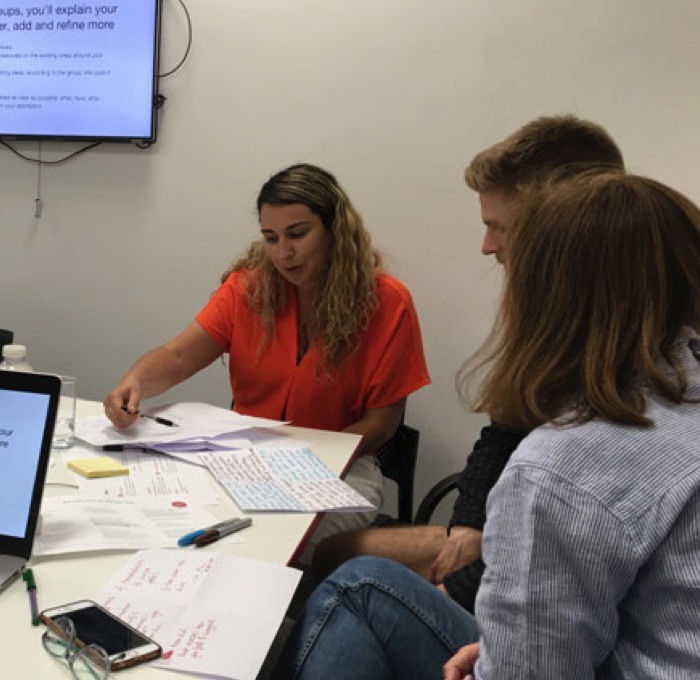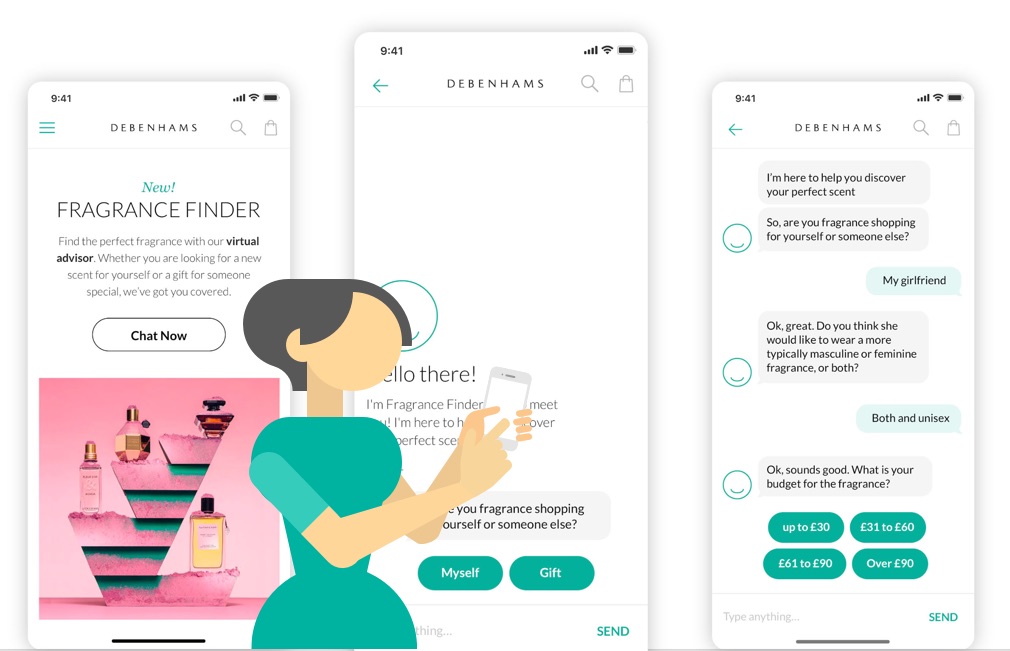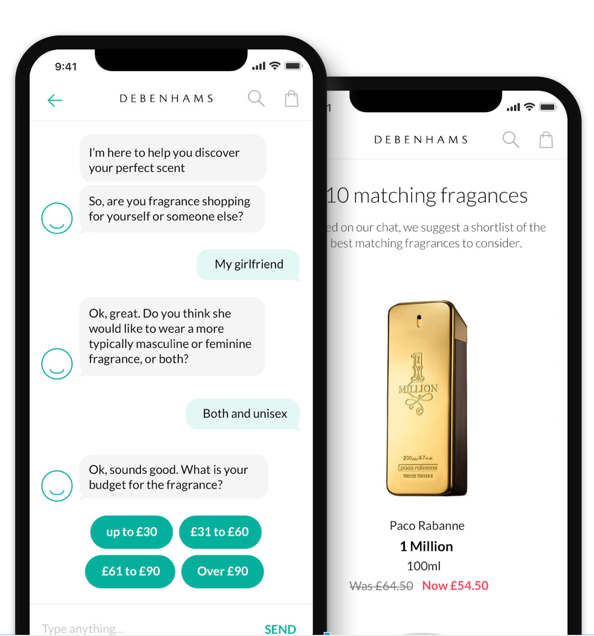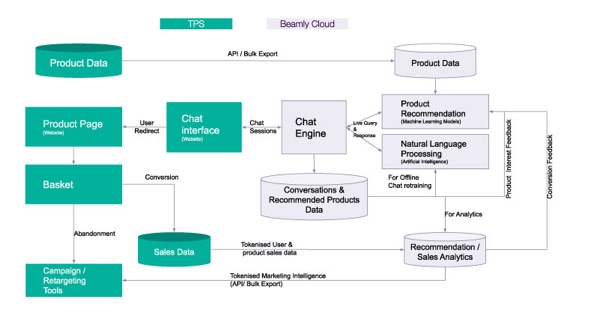Chatbot
AI-powered conversational experiences.
Chat-bots are revolutionary because they feel like a more human way to interact with our devices, but that’s what makes it so easy to get wrong.
The challenge
Create a chatbot to lead dynamic beauty-focused conversations for consumers to satisfy their unmet needs and acquire rich metadata. And if your client owns hundreds of brands, it makes sense that scalability was one of the main priorities for every project to run.
The assignment
Design the framework, a complete set of conversational UI assets and create a conversation script. It should be easy to scale and adapt to different industries, brands, retailers, data sets, and volume of users. And of course, raise user (interlocutor) curiosity and liking.
Ux goal
Beyond the script, the visual display of the conversation was one of this project’s most important UX challenges. Our foremost goal was to help users by understanding their needs; hence we needed to emulate human talks no just with the script but also with the visual interface to make it natural for the user to express.
COMPANY
Beamly
TEAM
TrendsLab
TIME
7 months
ROLE
Lead Product Designer
What did we want to learn?
Who are the investors?
71%
71%
of users are willing to make use of a conversational interface, such as a messaging app to get customer assistance
70%
70%
of shoppers use their phone to inform their in-store purchases.
KNOWING USERS
We run quantitative surveys to define the segments of potential users and the motivations to address our chatbot. Then we did qualitative interviews to understand their concerns and how they solved these issues in the past. We clustered these insights into motivational groups. This information was valid to design the conversation script and drawing user flows.
We found two significant users to meet their requirements. One is for people whom need to stretch the lack of information or need assistance; The second group was people to enhance their knowledge. For them, the Chabot would solve a major pain point and would allow some learning through the app.

BUSINESS OBJECTIVES
- Providing the user with information and encouraging her shopping
- Learning something about the user and creating loyalty.
- Make the data useful and usable to decision-makers.
- Use data to make decisions that succeed every time.
OUTLINING THE OPPORTUNITY
The opportunity is where underserved consumers' needs are. From JTBD perspective, we were confident to assist beauty consumers by creating meaningful conversations with brands about their beauty struggles.
- Great opportunity for rapid, cost-efficient market research.
- Flexible & scalable to new types of information/input.
- A fluid approach to gathering concerns and answering questions
- Any-time client support.
- Behaviours shown by previous users are factored into the recommendation model.
COMMUNICATION
Personalised brand/retailer conversations with consumers.
SERVICE
Deals with complex requests and simplifies product research.
TRANSACTION
Streamlines purchases & sampling.
COMPETITOR ANALYSIS
COMPETITOR ANALYSIS
We gathered three main types of services with similar constraints and results based on the search engine.
Based on the search engine, we were able to gather three main types of services with similar constraints and results.
Filters
FACETED SEARCH
Filters on the category page
Focus on attributes, not needs
Quiz
Quiz
FIXED FLOW
Pre-defined decision tree
Fixed questions with fixed response options leading to a fixed recommendation.
Data science models determine the best questions to ask to give the user optimal results.
Intelligent advisor
FLUID FLOW
Natural language understanding — ask anything, go anywhere
Entity extraction to match topics in chat to products or content
The fluid result set presented based on user response
Chatbot framework
Who are
the investors?
I followed this the framework to build our first prototype:
1. Scope
Explains what the chatbot is all about to make clear what people can expect from our chatbot.
2. Personality
Defining in advance how our chatbot will be will help us eventually decide how the bot will talk and act in every circumstance. Our research revealed who was our early adopter and in which situation they would be talking to the chatbot. Therefore, we create a user persona profile with a personality that fits into it to guide the chatbot's voice and tone, the bot’s humour, and even its style.
3. Interactivity
To avoid long chats we opted to offer users buttons and links to click on.
4. Information architecture
We decided on the information to be offered or hidden in every step, as well as the elements such as images, buttons or prices.
5. Navigation flow
How will the chatbot behave in every possible scenario in its interaction with every user? Which interaction element will the user be using, and what will happen if they misunderstand any step?


We opted for Self-learning, which uses Machine Learning-based approaches taken from collected data. The retrieval-based model takes the best response from a library. The context could include a current position in the dialogue tree, all previous messages in the conversation, or previously saved variables: the more users, the better the responses.
By utilizing NLP, developers could organize and structure knowledge to perform tasks such as automatic summarization, translation, named brand recognition, relationship extraction, sentiment analysis, speech recognition, and topic segmentation.
Verbal communication
We write all possible topics and conversation pieces based on our previous research. We wanted to quickly check how complex the final script could be before moving on to the dialogue tree.
Then, we divided and organized the parts into functional groups and began to see some patterns. Some groups were goal-related, others were responsible for making the conversation less robotic, another group provided the user with options or additional information, and there were reactions to user responses.
Finally, we write the final script of the conversation. This part was fun, but it also required maximum focus. It was much easier with the script divided into blocks since all parts of the conversation could be written separately.
At this stage, we work on the visual stuff, such as statements vs. paragraphs, bubbles, and scrolls.
Non-verbal communication
We looked at every detail of the Chatbot’s appearance to make the conversational UI feel more natural. That included statements vs. paragraphs, bubbles, and scrolls, among other things. We agreed that the avatars and messages of both users are opposite one another, reflecting the nature of a real face-to-face conversation.
Additionally, we decided to use typing indicators to suggest the user's answers. A static typing indicator is displayed next to the user avatar, but when the user hovers, let’s say, the close-ended answer button, the typing indicator starts to animate.
We also took the emojis as important parts of a natural conversation and their value depending on the context.
AI-POWERED RETARGETING
Fragrance Advisor enables highly specified retargeting through data mining (analytics module):
- General interests
- Personal purchase vs. Gift
- Recommended items
- Disliked items
- Price threshold


DATA FLOW
Besides the dialogue flow, our second main goal was data collection for machine learning training and marketing solutions. For the Chatbot to succeed, it had to be someone who listens to you and uses your input to give you the best answer—not a spy.
Rather than asking for personal details, the goal was to capture significant insights across the conversation. But also we built a flow for less playful users that needed quick responses.
CONCLUSION
Building a great chatbot involves technology, psychology, and copywriting. When designing a chatbot, we must go further than the classic decision tree. Feel free to test my framework with the four main steps: the bot scope, the chatbot personality, a prioritized list of must-haves and the chatbot flow.
MEANINGFUL IMPACT
We perform multiple tests with users and distribute the Chatbot among different circles to teach the bot and detect errors. Finally, we made a soft launch on Debenhams by tweaking some features to boost online shopping. This virtual advisor got 36% CTR during the first month.
Nanodoce
the alter ego behind Fernando Magan.
©nanodoce 2024
Please note that most projects are subject to a confidentiality agreement.